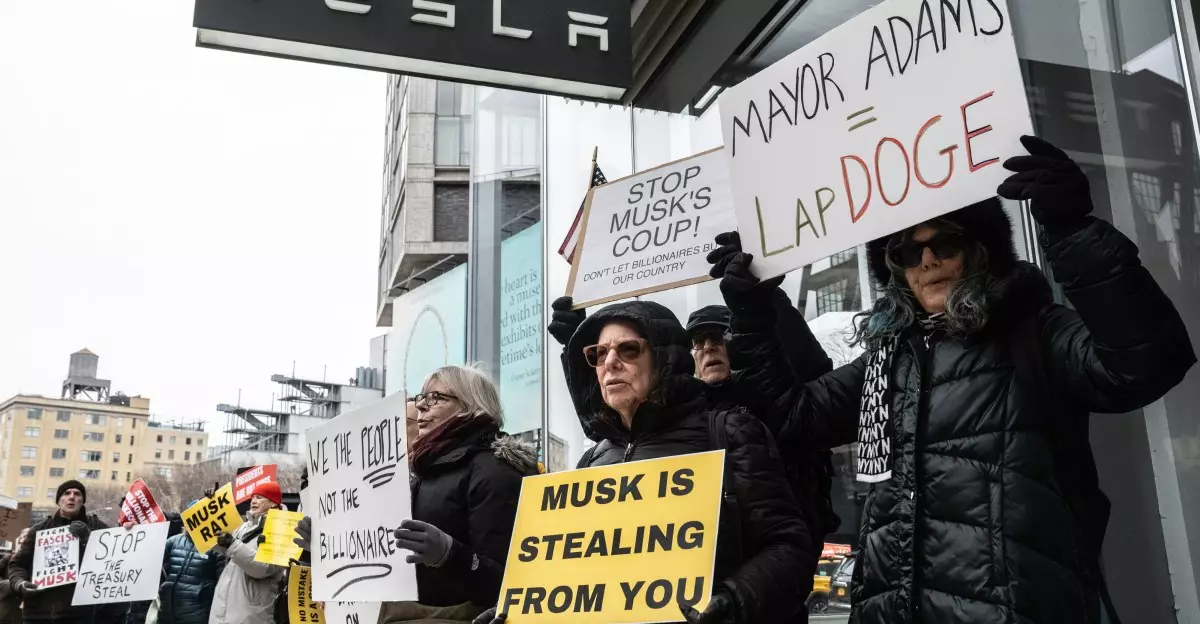Over the past weekend, a wave of protests spread across various cities in the United States, targeting Tesla showrooms. The demonstrations seem to stem from growing concerns regarding CEO Elon Musk’s increasingly controversial actions, particularly since he assumed his role as the head of the Department of Government Efficiency during the Trump administration. This initiative, aptly dubbed #TeslaTakeover on social media platforms, has galvanized protestors who seek to hold both Tesla and Musk accountable for what they perceive as irresponsible leadership and divisive politics.
Social media’s role in organizing these protests cannot be understated. Platforms like Twitter and Bluesky have served as essential tools for activists, with many individuals sharing their experiences and rallying others to join in solidarity. The protests, although not massive in scale, have been consistently reported across numerous locations – from bustling metropolises like New York City to smaller suburban settings such as Golden Valley, Minnesota. This geographical diversity underscores a pervasive national sentiment, suggesting that concerns about Tesla are not confined to any single demographic or region.
The protests come at a time of increased anxiety among Tesla investors and employees. According to recent reports, Tesla’s stock price experienced a significant decline of 21% since Donald Trump took office, prompting worries that Musk’s political engagement and polarizing public persona might be damaging the company’s long-term prospects. Employees reportedly voiced their frustrations during internal meetings, with some stating that they believe the company would be in a better position if Musk stepped down from his role.
This internal dissent echoes larger perceptions of Musk’s leadership. While his innovations in electric vehicles and space exploration have earned him tremendous respect and admiration in some circles, there is a growing faction that holds him accountable for the larger ramifications of his actions and statements. The protests thus serve as an outlet for employees and investors who feel their voices are increasingly marginalized in the face of Musk’s celebrity.
At the heart of these protests are poignant messages aimed at drawing attention to Musk’s controversial political stances and affiliations. Protestors chanted slogans such as “Don’t buy swasticars” and “Elon Musk can go to Mars; we don’t need your Nazi cars,” referencing allegations of his support for far-right political groups and earlier controversial gestures. These slogans signify a broader sentiment among demonstrators who feel that Musk’s actions may not only risk the future of Tesla but also contribute to a societal climate they oppose.
Prominent activists and celebrities are also lending their voices to amplify these protests. Alex Winter, an actor and director, passionately urged people to take decisive action against Tesla, showcasing that the dialogue surrounding Musk is not merely a niche tech industry issue but one with widespread cultural implications. Such endorsements from notable figures bolster the credibility of the protests and motivate more individuals to reconsider their support for Musk and Tesla.
Despite the varied responses across the nation, it is clear that the protests have sparked vital conversations concerning corporate accountability and the ethical implications of leadership in the tech industry. As more demonstrations are planned in the coming weeks, including additional protests on President’s Day, it remains to be seen how Tesla will address these mounting criticisms.
The impacts of this dissent may play a crucial role in shaping Tesla’s future trajectory. Will the company acknowledge the grievances and adjust its public relations strategies, or will it maintain the status quo and risk further alienating both employees and investors? With a landscape increasingly populated by concerned individuals ready to voice their dissent, it is evident that the ongoing saga surrounding Tesla, Elon Musk, and the broader implications of his governance will warrant scrutiny in the months ahead.
The protests mark an important chapter in the dialogue about corporate responsibility, the intersection of politics and business, and the role that influential leaders play in shaping not just their companies, but also societal norms and values. As the movement grows, so too does the potential for change within and beyond Tesla’s framework.

